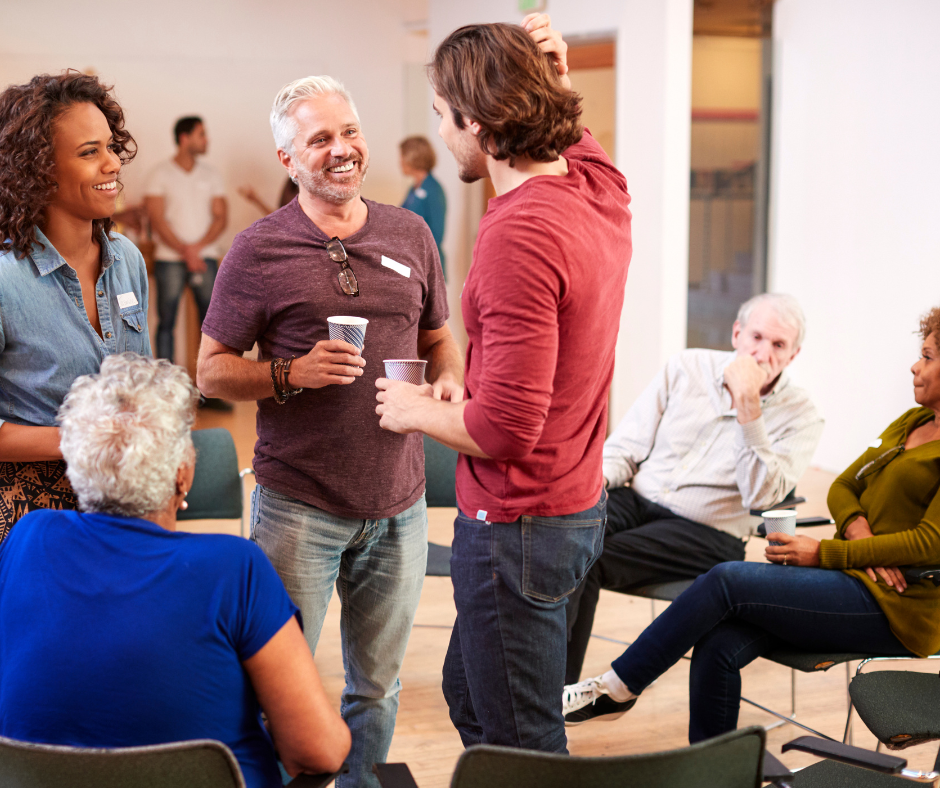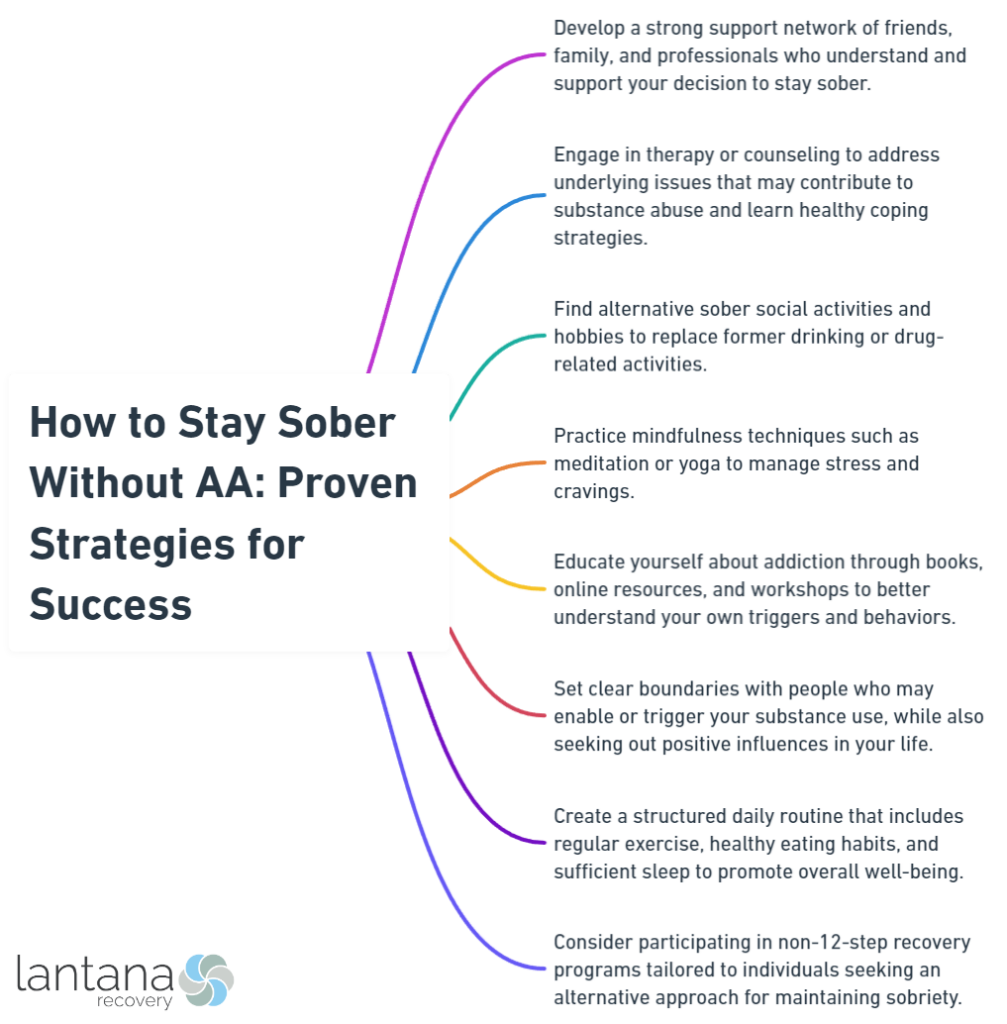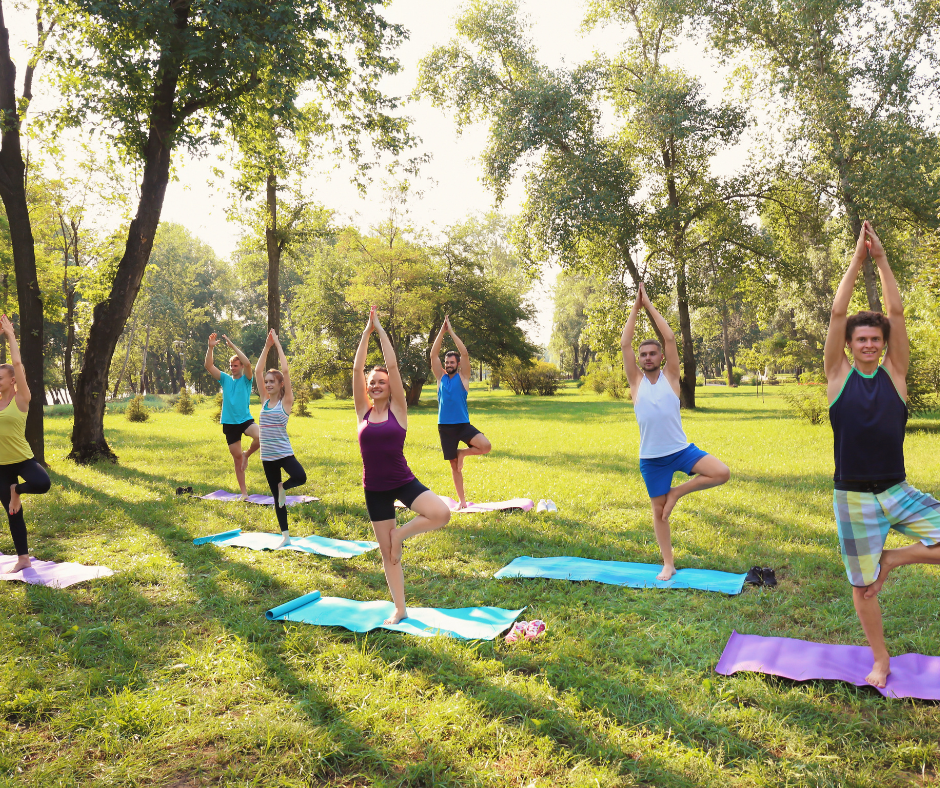Are you seeking a path to sobriety without attending Alcoholics Anonymous (AA) meetings? It’s absolutely possible! In this blog post, we’ll discuss “how to stay sober without AA” by exploring numerous alternative support groups, professional help options, online resources, and lifestyle changes that can help you achieve and maintain sobriety. These empowering approaches will guide you towards a healthier, alcohol-free life.
Short Summary
- Explore alternative support groups, professional help and counseling services, online resources & programs to stay sober in 2024.
- Make healthy lifestyle changes such as exercise, nutrition and mindfulness for successful recovery journey.
- Build a supportive network by joining Meetup Groups or Online Communities to aid your sobriety goals.
Alternative Support Groups

While Alcoholics Anonymous (AA) is the most well-known support group for alcohol addiction, it’s not the only option available. Many alternative most addiction support groups, such as SMART Recovery, Refuge Recovery, and LifeRing, provide a diverse range of approaches to help individuals in their journey toward a sober and healthy lifestyle. In addition to AA meetings, these groups offer valuable resources for those seeking support.
By exploring these groups, you’ll find the one that resonates best with you and supports your recovery journey.
SMART Recovery
SMART SMART. Recovery is a non-12-step, evidence-based addiction recovery program that offers free support groups and a practical 4-Point Program to help you gain independence from alcohol and drug addiction so you can stay sober at your next party. The 4-Point Program empowers you to build and sustain motivation, confront cravings, manage your thoughts, emotions, and actions, and lead a balanced, healthy, and happy life.
The compassionate atmosphere provided by SMART Recovery enables you to discover how to take charge of your addiction and hone the ability to remain sober in everyday life. With an array of incredible resources like free online meetings, a 24/7 online chatroom, and a library of resources endorsed by the mental health services administration, you’ll never feel alone on your journey.

Refuge Recovery
Refuge Recovery is a powerful program that incorporates the teachings of Buddhism to help you fight alcohol abuse. It utilizes the Four Noble Truths and the Eightfold Path to provide you with the strength and courage to overcome your addiction. Regular attendance at group meetings, meditation, personal inventory, mentorship, retreat, and service are integral components of the program, ensuring your success and growth.
This support group offers a welcoming community and a comprehensive approach to addiction recovery, incorporating mindfulness and meditation techniques to help you cope with other unexpected life events. To learn more about Refuge Recovery and access their wealth of resources, visit their website, blog, and online meetings, or explore their worldwide centers.
LifeRing
LifeRing is a secular, non-profit organization providing peer-run addiction recovery groups to empower you to take control of your sobriety journey. This abstinence-based program focuses on providing positive social reinforcement and self-direction, allowing you to reach your goals and establish a sober lifestyle.
Emphasizing personal accountability and developing a tailored recovery program, LifeRing nurtures a non-judgmental atmosphere and offers a network of peers who are also in recovery. To get involved with LifeRing, attend a meeting, or contact the organization directly – it’s a great opportunity to make a positive impact on your life.
Professional Help and Counseling

Seeking guidance from mental health professionals, such as therapists at Lantana Recovery in Columbia, South Carolina, psychologists, or psychiatrists, is a crucial aspect of overcoming alcohol addiction and maintaining sobriety. These professionals can offer specialized assistance, tailored to your unique needs and circumstances, providing the support and tools necessary for a successful recovery.
In the following subsections, we will delve into various types of professional help available to you.
Individual Therapy
Individual therapy is an opportunity to work one-on-one with a therapist to identify and address underlying issues contributing to your addiction, develop coping strategies, and progress toward achieving your goals. Regular sessions with your therapist can help you gain a better understanding of yourself and your emotions, providing tools to help you work through personal issues and mental health concerns.
Uncovering the root of addiction, beginning the healing journey, and discovering how to modify behaviors are all great benefits of attending individual counseling. Working with a therapist can empower you to recognize and address potential causes of addiction, as well as learn the tools to help you stay sober.
Group Therapy
Group therapy is a powerful therapeutic tool that offers a unique opportunity for individuals to come together and support each other while discussing their issues. It typically involves a group of 6 to 12 clients who meet regularly with one or two group therapists and is especially effective in treating substance abuse.
Group therapy can create a secure and encouraging atmosphere for people to express their stories and gain knowledge from others who are going through similar difficulties. It can also assist individuals in cultivating coping strategies, recognizing their behavior, and building a reliable support system with a support group committed to their well-being.
To find a group therapy session, you can check with mental health clinics, hospitals, and private practices, or search online for local support groups.
Family Therapy
Family therapy is an essential aspect of addiction treatment, as it explores how the behaviors of the person with the substance use disorder affect the family unit and works collaboratively to create positive change. This type of counseling involves multiple family members to address issues within the family and focuses on family-level assessment to transform familial relations.
The advantages of family therapy include a nurturing, non-judgmental atmosphere, a focus on personal accountability and self-direction, and a network of peers who are also in recovery. To start family therapy, find an experienced family therapist through a referral from your doctor or by searching online for a therapist near you.
Online Resources and Programs

In today’s digital age, there are numerous online platforms and apps designed to help individuals maintain sobriety and connect with others in recovery. These resources provide valuable support, information, and tools to assist you in your journey toward a healthier, alcohol-free life.
Let’s explore some of the most helpful online resources and programs available.
Sober Grid
Sober Grid is a social networking app that connects individuals in recovery, providing a supportive community for staying sober. The app’s GPS locator user interface, called The Grid, allows you to find other people in recovery nearby, view their profiles, and connect with them.
In addition to connecting with others in recovery, Sober Grid offers a digital library of mental health resources, peer support coaching, and digital therapeutics. While the app offers valuable support and connections, it’s important to remember that it should not be considered a substitute for professional help and counseling.
Recovery Dharma Online
Recovery Dharma Online is an independent sangha of Recovery Dharma members who facilitate online meetings, workshops, and inter-sangha business. These online meetings are based on Buddhist principles and provide a supportive community for individuals in recovery.
The compassionate atmosphere and resources offered by Recovery Dharma Online can help you navigate your recovery journey and cope with unexpected life events. To access their meetings, workshops, and resources, visit their website and join the online community.
7 Cups
7 Cups is an online platform that provides free, anonymous emotional support through trained listeners and online therapy sessions. It offers a safe and confidential space to access emotional support and mental health services.
In addition to emotional support, 7 Cups offers topic-specific support groups and online therapy for a range of mental health concerns, including addiction recovery. By utilizing this platform, you can receive the support you need during your recovery journey and connect with others facing similar challenges.
Healthy Lifestyle Changes

Adopting new habits and activities that promote physical and mental well-being is essential for reducing the risk of relapse. By focusing on exercise, nutrition, and mindfulness, you can improve your overall health, increase your resilience, and boost your chances of maintaining sobriety.
Let’s explore these healthy lifestyle changes in more detail.
Exercise and Physical Activity
Engaging in regular exercise and physical activity is an excellent way to improve mood, reduce stress, and decrease cravings for alcohol. By incorporating activities like jogging, swimming, or yoga into your daily routine, you can significantly enhance your physical and mental well-being, making your recovery journey more manageable and enjoyable.
Regular exercise can help reduce stress and cravings, while also improving your mood. It can.
Nutrition
A balanced diet is a crucial component of a healthy lifestyle, especially during recovery. Eating nutritious foods and maintaining a well-rounded diet will provide your body with the essential nutrients it needs to perform optimally and support your overall health.
By focusing on a balanced diet, you can improve your mood, increase your energy levels, and reduce stress, all of which contribute to a successful recovery.
Mindfulness and Meditation
Practicing mindfulness and meditation techniques can be incredibly beneficial in reducing stress, increasing self-awareness, and strengthening emotional resilience. By incorporating practices like deep breathing exercises, guided meditation, and yoga into your daily routine, you can enhance your mental well-being, better manage cravings, and maintain a balanced life.
Building a Sober Social Network

Developing new friendships and connections with individuals who support your sobriety is an essential aspect of recovery. Surrounding yourself with positive influences and people who share similar interests can provide encouragement and motivation to stay sober and not drink.
In this section, we will explore various ways to build a sober social network.
Meetup Groups
Meetup groups are communities of people who come together to share their passions, hobbies, interests, and identities. By joining local sober meetups and social events, you can connect with others in recovery or with similar interests, creating a supportive network that fosters sobriety.
To find Meetup Groups, search online, ask friends and family, or contact local organizations. By participating in these groups, you can make meaningful connections, gain insights from others, and enjoy a secure and encouraging atmosphere to share your recovery journey.
Volunteer Work
Volunteering is a rewarding and fulfilling way to give back to your community and build a sense of purpose during recovery. By engaging in volunteer activities, you can develop new skills, meet like-minded individuals, and contribute to a cause you’re passionate about.
To find volunteer opportunities, search online, ask friends and family, or contact local organizations. Volunteering can be a truly fulfilling experience, but it’s important to remember to take care of yourself by taking breaks and getting enough rest to ensure that you’re getting the most out of your volunteering journey.
Online Communities
Online forums and social media groups dedicated to sobriety and recovery can provide valuable support and connection during your journey. By joining these communities, you can share your experiences, gain insights from others facing similar challenges, and access resources to help you stay sober.
Some inspiring examples of online communities include Sober Grid, Recovery Dharma Online, and 7 Cups. By utilizing these resources and connecting with others in recovery, you can build a supportive network that fosters sobriety and personal growth.
Medication-Assisted Treatment

Discussing medication options with a healthcare provider can be an effective way to help manage cravings and maintain sobriety. There are several medications available that can assist you in your recovery journey, such as Naltrexone, Acamprosate, and Disulfiram.
In this section, we will explore each of these medications and their benefits.
Naltrexone
Naltrexone is a prescription medication that can reduce cravings for alcohol and help prevent relapse. It works by blocking the effects of opioids, helping you avoid intoxication and physiologic dependence.
The primary advantage of Naltrexone is its ability to decrease cravings for alcohol and aid in avoiding relapse. Additionally, it can help lower the risk of overdose in opioid users. By using Naltrexone in conjunction with counseling and other recovery resources, you can increase your chances of maintaining sobriety.
Acamprosate
“Acamprosate, marketed under the brand name Campral, is an orally administered drug available by prescription in the U.S. and throughout much of the world for treating alcohol dependence. Its safety and efficacy have been demonstrated in numerous clinical trials worldwide” (Acamprosate, Mason & Heyser, 2011.) Acamprosate is a medication that helps restore balance in the brain during early recovery and reduces the risk of relapse. It targets neurotransmitters involved in alcohol dependence, such as glutamate and GABA, providing support for a successful recovery journey.
The advantages of taking Acamprosate include reduced cravings and urges to drink, improved mood, and increased motivation to stay sober. By using Acamprosate along with counseling and other recovery resources, you can strengthen your commitment to sobriety and improve your overall quality of life.
Disulfiram
Disulfiram is a medication that causes unpleasant side effects when alcohol is consumed, acting as a deterrent for drinking. It works by blocking the enzyme acetaldehyde dehydrogenase, which is responsible for breaking down alcohol in the body. This leads to a buildup of acetaldehyde, a toxic compound that causes unpleasant side effects when alcohol is consumed.
The primary advantage of Disulfiram is that it serves as a powerful deterrent for drinking, as the distasteful side effects linked to consuming alcohol are enough to dissuade someone from drinking. Furthermore, it can help to diminish cravings and boost motivation to remain sober.
Summary
In conclusion, there are numerous alternative paths to sobriety beyond AA. By exploring a variety of support groups, seeking professional help, utilizing online resources, adopting healthy lifestyle changes, building a sober social network, and considering medication-assisted treatment, you can create a personalized recovery plan with specialists at Lantanathat works best for you. Remember, you have the power to overcome addiction and lead a fulfilling, alcohol-free life.
Frequently Asked Questions
Is AA the only way to get sober?
Although Alcoholics Anonymous (AA) is a popular method for getting sober, there are many different pathways that can lead to long-term sobriety. Don’t be afraid to explore other options to find the right path for you.
What can I do instead of AA?
There are other resources and support systems available, such as SMART Recovery, Refuge Recovery, LifeRing Secular Recovery, Women for Sobriety, and Rational Recovery.
Find a support system that works for you and take the steps necessary to begin your journey of recovery today.
What percent of AA members stay sober?
According to addiction specialists and Alcoholics Anonymous’ Big Book, up to 75% of members stay abstinent or remain sober after relapses.
How do you stay sober when you don’t want to?
Take action to care for yourself, rely on a support system, seek help from therapy, distance yourself from difficult situations, and use exercise and healthy eating to stay sober when you don’t want to.
These are all important steps to take when trying to stay sober. Taking care of yourself is essential to maintaining sobriety. Relying on a support system can help you stay accountable and provide you with the encouragement you need. Seeking help from therapy can provide you with the tools to manage your problems.
How can professional help, such as therapy, assist in maintaining sobriety?
Therapy can help you access resources, identify the underlying causes of your addiction, and learn strategies to effectively manage your sobriety.
It is an important tool for maintaining long-term recovery.









